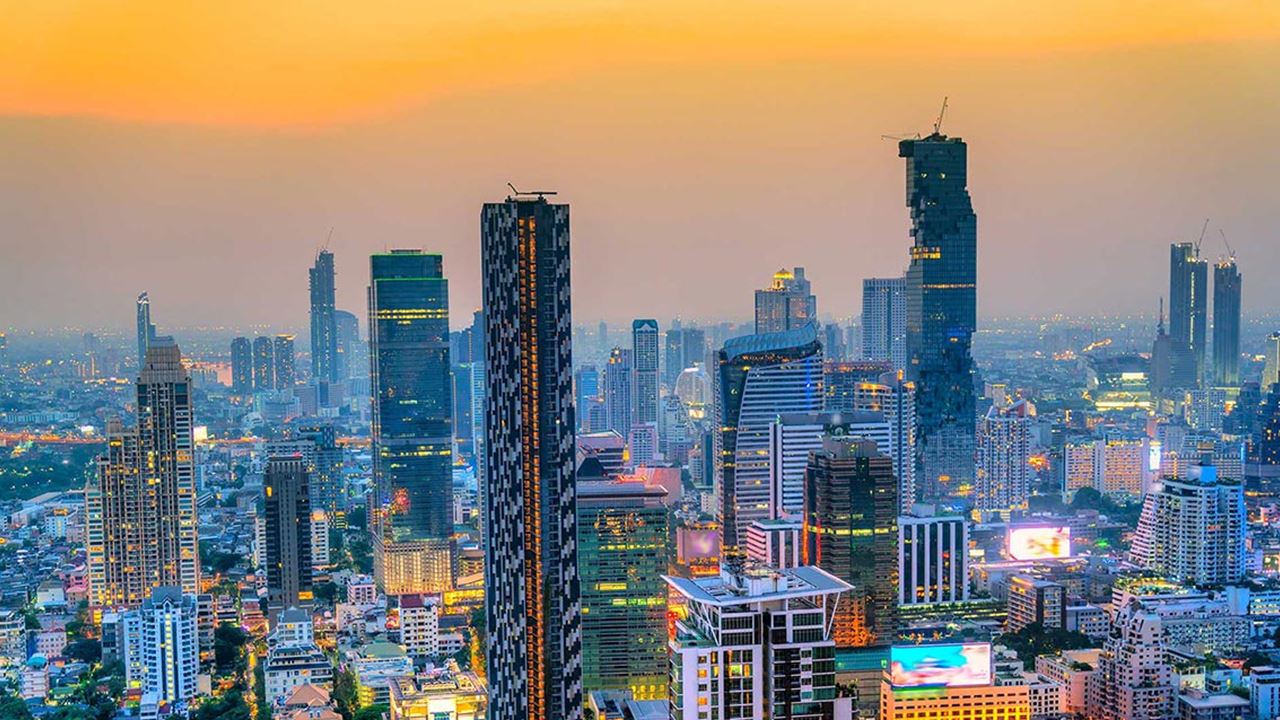With picture-perfect landscapes, a vibrant culture and world-famous cuisine, Thailand is one of the most visited countries in the world. And, as you might expect from such a popular destination, it also has a thriving expat community. Thailand also has one of the best healthcare systems in the world.
Whether you’re heading there to travel around the famous Thai islands, build a new life by the sea or start a job in the bustling metropolis of Bangkok, Thailand’s healthcare system is designed to look after everyone. It also has highly skilled medical professionals operating within both public and private hospitals, so you should be able to access good quality care from anywhere in the country.
Thailand operates a system called the Universal Coverage Scheme (UCS), which provides all Thai citizens with free public healthcare. If you move to Thailand to work, and are employed within the country, you can get free access to this public healthcare system via the country’s social security programme¹. If you aren’t going to be working in Thailand, it’s advisable to get private healthcare cover to give you access to Thailand’s excellent medical facilities and care without having to worry about spiralling costs.
The good news is that there are plenty of options, whatever your situation. We’ve put together an overview to help you work out what you might need and narrow down your preferences.
FAQs
Thailand offers such a high standard of healthcare that some people travel there specifically to undergo treatment or have a medical procedure. Its thriving ‘medical tourism’ trade has grown because the country offers an exceptionally high level of specialist care for a fraction of what it might cost elsewhere – particularly in Europe or America.
Thai doctors are highly trained and have access to state-of-the-art medical equipment, especially within most private hospitals. The country also has a very high proportion of specialist doctors in areas such as oncology, fertility, cardiology and fertility, so it’s well-equipped to help people with serious or complex issues.
Perhaps most importantly, the Universal Coverage Scheme means that this high standard of healthcare is funded by a small salary deduction, so it’s available to Thai citizens at no extra cost. Half is paid by the company and half by employee. This has had a great impact on the overall quality of life within Thailand, improving life-expectancy and reducing the number of sick days people are needing to take.
Thailand’s healthcare system has two main components: the government funded public health service, and the private medical sector. Both offer a very high level of care, dependent on where in the country you are based. All Thai citizens and visitors can have access to excellent doctors, whatever their circumstances, however travelling to a major city may be necessary to access a higher level of care.
While public healthcare facilities in Thailand are excellent, they serve a high proportion of the population so there can be long waiting times. Some of the facilities might not be as up to date, and people are assigned a specific hospital where they can receive free treatment, which can be limiting. Also what is covered under the social security scheme is limited so certain medication may not be covered.
Private healthcare is often more popular among expats. It offers a wider choice as you’re not restricted to a specific hospital. Private hospitals also tend to have much shorter waiting times, more up-to-date facilities, and multilingual staff. Thailand also has a fairly unusual healthcare issue in that, because it has so many specialists, there’s a relatively small number of general practitioners. This can add to the waiting times for referrals in the public system, which is another area where the private option can be appealing.
There are four main routes to accessing healthcare in Thailand.
As an employee of a private company.
As mentioned earlier, Thai citizens receive free public healthcare through the UCS (Universal Coverage Scheme). Foreign nationals can’t join this scheme, but you can get access to the same free healthcare system if your employer is able to enrol you onto Thailand’s social security programme. You’ll have a specific medical facility assigned to you, which is where you’ll need to go for free treatment. For emergency services at other hospitals other than your registered facility, social security will cover some of the expenses however the caps are relatively low. So, unless your life is hanging in the balance, it is best to receive treatment from the medical facility that you are registered with. If you choose to go to a different public hospital or a private facility, you’ll have to pay additional fees.
If you work as a civil servant.
If you’re a government employee, you and your family are entitled to healthcare coverage via the civil service welfare system. This is separate to the main public and private options, so you should speak to your employer for specific details on how this works.
Private health insurance.
If you’re not planning on working in Thailand, or if your company doesn’t offer access to health coverage via social security, you’ll need private healthcare cover. Many expats prefer the private route anyway, as it can provide more flexibility, shorter waiting times and a wider range of treatment options. You can either take out a domestic plan specific to Thailand, or you can get an international private healthcare plan that covers you throughout the rest of the world.
Out of your pocket.
If you’re an employee that only has public health cover, you can still walk into any private hospital and see a specialist if you have the money to pay for it. It could end up being a more expensive option, but the cost of treatment in Thailand is relatively cheap when compared to most western countries.
The Thai healthcare system is relatively simple to navigate. But there are a few important details and rules to remember, which might help make things easier in the event you need healthcare services while in Thailand.
Documentation
Whether you’re going to a private or a public hospital, you’ll be asked to show proof of identification (usually your passport) to receive treatment. You’ll also need your social security number if you’re hoping to receive free care from a public facility. Many private facilities also sign up and provide service for social security, so it is worth checking that out before you go. For many private facilities, you’ll likely have to pay for treatment up front and then get the costs reimbursed for anything that’s covered in your healthcare plan.
Emergency services
The telephone number for medical emergency services is 1669. There is also a special emergency service to help people visiting Thailand, which can be reached by dialling 1155.
In an emergency, Thailand’s Ministry of Public Health has outlined certain conditions that qualify for Universal Coverage for Emergency Patients. This technically means you can be admitted to any hospital without having to pay for any costs incurred in the first 72 hours.
In reality, though, a private facility may try and transfer you to a public hospital or ask you to pay for all the costs incurred. This is because they often struggle to get full compensation from the government so, if possible, try to go to a public hospital in an emergency as they won’t turn you away or ask for up-front payment.
Dental cover
Thailand’s public scheme does cover certain expenses, through your social security, you can be covered for basic procedures like routine cleaning, extraction and fillings for up to 900 baht per person per year. For any more advanced procedures or regular dental treatment in Thailand, you’ll need to take out a separate dental insurance or ensure it’s included in your international healthcare plan.
Pharmacies and medicine
It’s quite common to see medications, for which you’d usually expect to need a prescription, being sold over the counter in Thailand. These include antibiotics, pain medication and anti-malaria tablets.
There are a lot of pharmacies within larger cities, and many of them stay open late. Most pharmacists in Thailand are able to offer some guidance and advice, though you need to be aware that important information can be lost in translation, so it’s always best to get a note from a doctor or bring translated details of the medication you need to be on the safe side.
If you don’t plan on getting a job in Thailand – if you’re retiring there, for example – then you’ll need private healthcare cover. This has been made compulsory by the Thai government and you may need to provide proof that you have health insurance to apply for a long-term, non-immigrant visa.
If you’ve got a job in Thailand, there’s a bit more flexibility. It’s no longer mandatory to have health insurance to enter the country and you can access the public (and sometimes private) healthcare system via your employer. Public healthcare will only cover you for appointments at a specified hospital², so many expats opt to get private cover as well.
A local Thai health insurance plan will cover you for any treatment you need in the country, but your documentation will probably be in Thai and it won’t cover you during visits home or when you’re on holiday. Whether you’re travelling, working on a short-term contract or relocating permanently, you’ll likely expect to travel to other countries, so worldwide healthcare cover could be a more suitable option.
Annual Cover
Long-term cover
While there’s a lot to consider when moving to Thailand, our annual plans are designed to give you one less thing to worry about. Ranging from mental health services to 24/7 personalised support, you’ll have the peace of mind that comes from knowing you’ve always got somewhere to turn for help.
Virtual doctor service
Virtual Doctor Service from AXA. See a real doctor, from anywhere in the world.
With the Virtual Doctor service, you can have a medical consultation with a real doctor wherever you are in the world – from the comfort of your home, hotel or office. Better still, there are doctors on call and available 24/7.3
Benefits
With ancient temples, vibrant street-markets and tropical paradises to explore, Thailand is an unforgettable place to relocate to. We want to make sure you enjoy every minute of it, with comprehensive health insurance.
Virtual Doctor service
With our Virtual Doctor service, you’ll be able to speak to a real doctor over the phone or by video, wherever you are.³ Consultations are available in a number of different languages, including English, Spanish and Mandarin, which is helpful if you ever find it difficult to communicate with local doctors at a Thai medical facility.
Mind Health service
Relocating overseas is a brave step, but it’s not without its difficulties. The Thai culture and way of life is unlike most other places on earth, so it may take a while to settle in. This can make you feel a long way from home and your support network. If you feel isolated or overwhelmed, our Mind Health service is here to connect you to qualified psychologists, wherever you are.⁵
Emergency cover
We offer a range of comprehensive cover plans, with dental and medical scans (CT, PET, MRI) as standard. Choose the right level of cover that suits your new life in the Thai sunshine.
Claims and compensation
Compensation should be simple. Provided we have all the right information, over 80% of all eligible claims are paid within 48 hours.⁴
Second Medical Opinion service
Sometimes things get lost in translation, especially if you’re outside of Thailand’s bustling cities. So, for those moments when you just aren’t quite sure, you can get an independent second medical opinion from an international network of experts.6
Evacuation and repatriation
Our team can arrange evacuation and repatriation services during an emergency, so you can enjoy every experience in the knowledge that we’ve got you covered.
Who we help

Professionals
Whether you’re moving to work in Bangkok’s expanding financial district, starting a business or teaching at an international school, we offer comprehensive expat health cover for all your potential needs. From prescriptions to hospital visits, we’ll give you one less thing to worry about during your day-to-day life.

Families
If you’re moving to Thailand with your family, your priority will be to make sure that all of you are covered for any eventuality. From pregnancy and emergencies to dental check-ups and eye tests, we have international medical insurance options to cover you and your family, whatever life throws your way.

Retirees
If you’re retiring to Thailand, you’ll need to have international health insurance in order to get a long-term, non-immigrant visa. We offer plans that offer cover for prescriptions, annual health check-ups, palliative care and disability compensation.
Our customers say...

Our customers’ reviews, independently moderated and managed by feefo. Based on 0 total reviews.
Related articles
*Lines are open Monday to Friday, 8am-5pm (GMT).
Calls may recorded and/or monitored for quality assurance, training and as a record of the conversation.
The Virtual Doctor, Mind Health and Second Medical Opinion services are provided by Teladoc Health.
The Virtual Care from AXA service is now available to all Individual and SME members (excluding those whose health plan is insured by AXA General Insurance Hong Kong Limited).
All Information in this article was correct at the time of publishing
Local insights have been approved by Oban International’s LIME (Local In-Market Expert) network’ - https://obaninternational.com/lime-network/
1 By law the employer has to pay social security, but there are exceptions this does not apply to (1) public officials, permanent employees, daily temporary employees and hourly temporary employees of Central Administration, Provincial Administration and Local Administration but excluding monthly temporary employees; (2) Employees of foreign government or international organizations; (3) employees of employers who have offices in the country and being stationed abroad; (4) teachers or headmasters of private schools under the law on private school; (5) students, nurse students, undergraduates or interning physicians who are employees of schools, universities or hospitals; (6) other activities or employees as may be prescribed in the Royal Decree.
2 For emergency services at other hospitals other than your registered facility, social security will cover some of the expenses however the caps are relatively low. So, unless your life is hanging in the balance, it is best to receive treatment from the medical facility that you are registered.
3 The Virtual Doctor service is part of our Virtual Care from AXA service. Appointments are subject to availability. You do not need to pay or claim for a consultation but you will be charged for the cost of the initial phone call when using the call back service. You won’t be charged if you request a call back using the app or online portal. Telephone appointments are available 24/7/365 and call-backs are typically within 24 hours. Video appointments in English, Spanish and Mandarin are available between 08.00 and 00.00 UK time, Monday to Friday. Video appointments in German are available between 08:00 -20:00 CET, Monday to Friday
4 80.6% of eligible claims submitted online between July 2022 and June 2023 were paid within two days.
5 Mind Health psychologist appointments are available in English and Spanish between Monday and Friday, 09.00 - 17.30 (UK time). If you are calling from the UAE, appointments are available between Saturday to Thursday, 09.00 – 20.00, and Friday 09.00 – 16.00 (UAE time). The service, provided in partnership with Teladoc Health, provides access to six sessions with a psychologist, per mind health concern, per policy year. The Mind Health service is part of our Virtual Care from AXA service.
6 Our Second Medical Opinion service is here for you anytime you’re unsure over a diagnosis or recommended course of treatment. It’s part of our Virtual Care offering, along with the Virtual Doctor and Mind Health services, so you might have already seen it on your plan or on the Virtual Care from AXA <app> or <portal>. Provided in partnership with Teladoc Health, the service unlocks access to a network of over 50,000 world-leading specialists and connects you to a doctor who will review your case alongside an expert. They’ll work with you to help you understand your diagnosis, make sure you know your options and support you throughout any treatment, wherever you are in the world.

